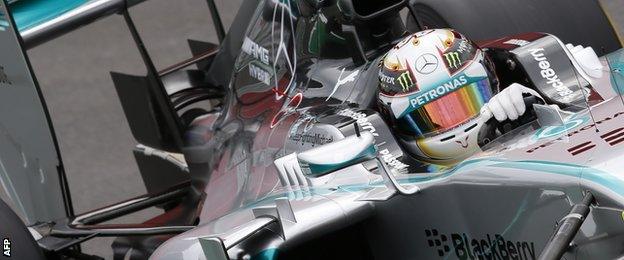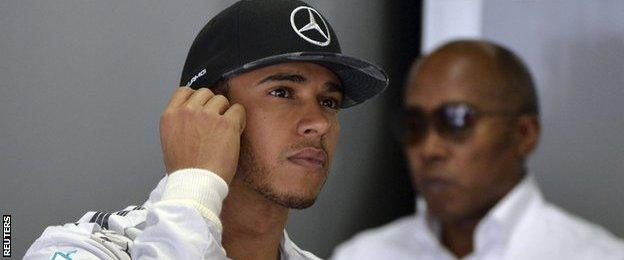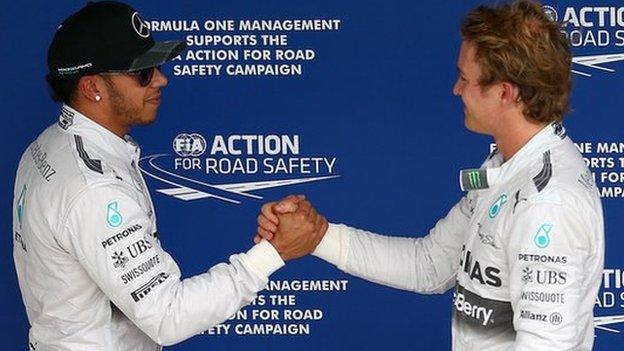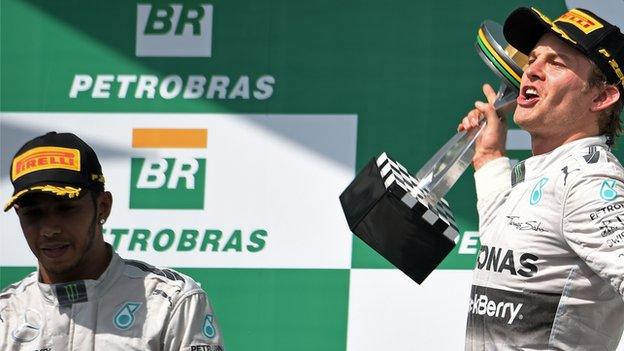Lewis Hamilton v Nico Rosberg: German win sets up anxious finale
- Published
- comments
In any other Formula 1 season, Lewis Hamilton would have to finish only sixth in the Abu Dhabi Grand Prix on 23 November to clinch his second world title, even if Nico Rosberg won the race.
But the intensely controversial decision made last December, at Bernie Ecclestone's behest, to award double points at the final race of the season, means Hamilton now has to be second to his Mercedes team-mate in the same scenario.
Whether that is right or not is a matter of opinion. But at least Rosberg's victory in Brazil on Sunday, which reduced the gap between them to 17 points, means that double points has not affected whether the championship went to the wire.
Rosberg on the rise

Rosberg said he learned from his experience in the previous race in the USA, where Hamilton overtook him to win
It was a copybook weekend from the German, exactly what he needed to re-establish his position as a credible championship contender in many eyes.
Until his flawless weekend in Sao Paulo, Rosberg had won just four races to Hamilton's 10.
He had three times seen a championship lead of more than a victory's worth of points eroded by his team-mate.
And he had beaten the Briton only once when they had started from the front row together. And that was in Monaco, where overtaking is all but impossible, and where Hamilton's attempt to take the lead at the pit stops was thwarted by a safety car.
Heading into Brazil, Hamilton had won five races in a row, to turn what had been a 29-point deficit to Rosberg after the Belgian Grand Prix into a 24-point advantage.
At Interlagos, though, Rosberg answered criticisms that he would not be a worthy champion as a result of this in the only way he could, and in the best way possible.
Double jeopardy: Hamilton v Rosberg for the title |
|---|
Hamilton now has a 17-point lead over Rosberg with a maximum of 50 points remaining at the final race in Abu Dhabi. Hamilton can win the title by finishing second to Rosberg in Abu Dhabi. Third or lower and Rosberg is champion if he wins. All the title permutations for the final race |
Fastest in every practice and qualifying session, Rosberg led the race from start to finish other than around the first pit stops.
It was a convincing riposte, and a ruthlessly effective way to halt the unstoppable momentum Hamilton appeared to be building up.
The only fly in the ointment for Rosberg was that Hamilton was again demonstrably the faster of the two drivers in the race.
He was able to follow within a second of Rosberg for lap after lap, despite the deleterious effect this had on his car's aerodynamics, and when Rosberg made his second pit stop, Hamilton unleashed breathtaking pace that initially looked as if it might leapfrog him into the lead, until he half-spun.
Hamilton wasted no time after the race pointing out that he was the quicker of the two drivers but in the end it did not do him any good. Rosberg, controlling his pace with good judgement, had enough to hold him off.
Would Hamilton have won without his spin?
During the race, the turning point appeared to be Hamilton's spin on lap 28, as he pushed flat out to try to leapfrog Rosberg over the course of their second pit stops.
Initially, Hamilton said he thought this had cost him victory, but closer examination of the race with the Mercedes engineers revealed this was not necessarily the case.
Straight after the race, Hamilton said he did not know why the team had left him out for a second lap before his own second stop.
The reason was straightforward. Despite setting the fastest times of the race to that point in the first and second sectors of his first lap following Rosberg's stop, Hamilton had not quite done enough to ensure he would rejoin ahead of Rosberg had he made his own stop at the end of that lap.
So his engineers decided to give him another tour to try to make up some extra time, reasoning that with the pace he had shown on that first lap, he should easily have made it.
As one of them said: "You don't bring someone in when they have just set two purple [fastest on the screens] sector times."
But the reasoning of the Mercedes engineers had not taken into account the effect Hamilton's pace had had on his tyres.
"When they told me to push I thought I had one more lap to do," he said. "So I used all the tyres I had left. But when they told me to go by the pits, the rears were going. I could feel it through Turn Three, so I probably wouldn't have been able to stay at that pace."
And then came the crucial mistake, when he locked the rear tyres going into Turn Four and ran wide into the run-off area, half-spinning.
"They told me to do a switch change," Hamilton said. "As I was doing it, I didn't go back on my brake balance. I locked the rears. One thing kind of happened after the other.
"Ultimately it was a mistake. But I'm not going to look back at it. It's done and dusted. No regrets. It's seven points lost; I still got second."
"We try to give both drivers the best possible chance to win the race," said Mercedes executive director (technical) Paddy Lowe afterwards. "For Lewis, it just didn't quite work out today."
Hamilton's blistering pace

Hamilton was quicker than Rosberg on the track but could not find a way past his team-mate
Although he lost more than seven seconds with the spin, Hamilton made up all that time over the course of a third stint that was highly impressive, even allowing for the fact that Rosberg was taking it easy on his tyres and not driving as hard as he might otherwise have done.
At that stage, it looked as if Hamilton would have enough speed to pass Rosberg for victory on track, just as he did in Austin the week before.
But although he spent the final 20 laps after their final stops tucked up right behind his team-mate, Rosberg was too canny, and they crossed the line just over a second apart, after Hamilton backed off slightly in the last sector of the final lap.
It was the second weekend in succession in which Hamilton had been beaten to pole position but been demonstrably faster in the grand prix. And afterwards, neither he nor the team appeared to have any real explanation.
"I'm quicker in the race, that's clear," Hamilton said. "I think in qualifying I sometimes get it right and sometimes don't. I know I can be quick."
Hamilton in the pound seat

Hamilton is 17 points ahead in the title race going into the final race in Abu Dhabi
In his last words to the media before leaving Brazil, Hamilton summed up his mindset heading into the final race: "There are a lot of positives to take from today."
Indeed there are. Mercedes are so far clear of their opposition that Hamilton and Rosberg should easily be able to finish one-two in Abu Dhabi, for the 12th time this season.
So, in theory, the title should be as good as won for Hamilton.
But that is assuming everything goes well for both drivers on the technical front.
The season has hardly been plain sailing for Mercedes on reliability grounds, and it is only four races since Rosberg failed to finish in Singapore for the most bizarre of reasons - a smidgen of cleaning fluid that found its way into the steering column electronics and sent his car's systems into meltdown.
A modern F1 car is so complex that there are literally thousands of things that could go wrong for either Mercedes driver in Abu Dhabi, even though the team will do their utmost to ensure nothing does, as they have all season.
It will be an anxious weekend, I suggested to Lowe on Sunday afternoon in Brazil. Yes, he nodded, with the tightest of smiles.
- Published10 November 2014

- Published9 November 2014

- Published26 February 2019
